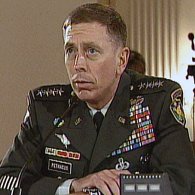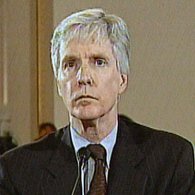2007年VOA标准英语-Military Surge in Iraq Assessed in US Congress(在线收听)
Capitol Hill
11 September 2007
General David Petraeus, the U.S. commander in Iraq, faced tough questions Monday while testifying before two congressional committees about what he says has been significant progress against al-Qaida and extremist groups in Iraq. VOA's Dan Robinson reports, Petraeus told lawmakers he would reduce U.S. forces by the middle of next year to pre-military surge levels, while he and U.S. Ambassador to Iraq, Ryan Crocker, cautioned against any rapid U.S. departure.
 |
| U.S. Gen. David Petraeus testifies before the House Armed Services Committee on Capitol Hill in Washington, on the situation of Iraq , 10 Sep 2007 |
From majority Democrats, including the two committee chairmen, he faced skeptical questions about the Iraqi government's ability to act on political reconciliation and other issues.
Armed Services chairman Ike Skelton and Foreign Affairs chairman Tom Lantos:
SKELTON: "The witnesses must tell us why we should continue sending our young men and women to fight and die if the Iraqis won't make the tough sacrifices leading to reconciliation."
LANTOS: "We cannot take any of this administration's assertions on Iraq at face value any more and no amount of charts or statistics will improve its credibility."
Petraeus said objectives of the surge, which brought U.S. forces in Iraq to about 168,000, are in large measure being met with substantial although uneven progress by U.S. and Iraqi forces.
But House Speaker Nancy Pelosi, in a written statement, called continuation of the military surge unacceptable and asked for "a much more aggressive timetable than the one outlined" by General Petraeus."
Petraeus pointed to Al-Anbar province, where local leaders and officials turned against al-Qaida, as a primary example of progress.
"A year ago the province was assessed as lost politically," said General Petraeus. "Today it is a model of what happens when local leaders and citizens decide to oppose al-Qaida, and reject its Taliban-like ideology."
He also said al-Qaida in Iraq and its affiliates suffered setbacks. Shia militia and Iranian-supported extremist groups, he said, were disrupted and sectarian violence in Baghdad and other areas is down.
Responding to suggestions by Democrats and anti-war critics that his report was simply an expression of President Bush's position, Petraeus said it had been cleared with neither the White House nor the Pentagon, and had the support of the military Joint Chiefs of Staff.
Congressman Duncan Hunter was among Republicans accusing Democrats of trying to discredit Petraeus for partisan political reasons.
"The idea that we have spent the last week prepping the battlefield by attacking the credibility of the messenger [Petraeus] is something that I think goes against the great tradition of this House," said Congressman Hunter.
While Petraeus envisions withdrawing five military brigades from Iraq by July of 2008, beginning with a Marine brigade this month, he not be drawn into speculation about further reductions, and warned against any precipitous withdrawal.
"Our experience in Iraq has repeatedly shown that projecting too far into the future is not just difficult, it can be misleading and even hazardous," he said. "The events of the past six months underscore that point."
 |
| U.S. Ambassador Ryan Crocker testifies before before the House Armed Services Committee hearing on Capitol Hill in Washington, on the situation of Iraq, 10 Sep 2007 |
"Leaders from all communities openly acknowledge that a focus on sectarian gains has led to poor governments and served Iraqis badly, and many claim to be ready to make the sacrifices that will be needed to put government performance ahead of sectarian and ethnic concerns," said Ambassador Crocker.
Crocker also warned against a premature U.S. withdrawal, asserting this would only help Iran, and benefit al-Qaida in Iraq.
Monday's public hearing was marked by interruptions from protesters shouting "Out of Iraq" and other slogans. Capitol police reported four arrests, including anti-war activist Cindy Sheehan.
Ambassador Crocker and General Petraeus appear Tuesday before two Senate panels. The White House is due to send Congress a separate report on Iraq by September 15.